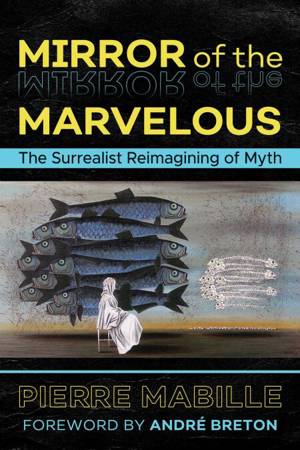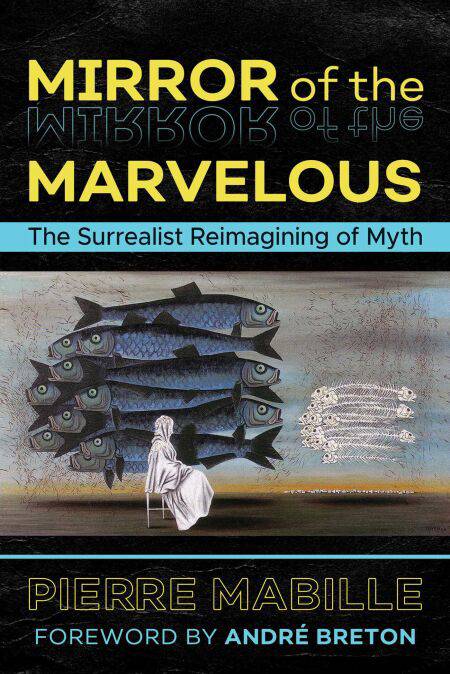
- Afhalen na 1 uur in een winkel met voorraad
- Gratis thuislevering in België vanaf € 30
- Ruim aanbod met 7 miljoen producten
- Afhalen na 1 uur in een winkel met voorraad
- Gratis thuislevering in België vanaf € 30
- Ruim aanbod met 7 miljoen producten
Zoeken
€ 15,65
+ 15 punten
Uitvoering
Omschrijving
A surrealist exploration of the marvelous in ancient, classic, and modern works from around the world
• Long considered one of the most significant and original books to have come out of the surrealist movement
• Reveals the “marvelous” in works from William Blake, Edgar Allen Poe, William Shakespeare, Chrétien de Troyes, and Arthur Rimbaud; legends and folktales from around the world; classics from Ovid, Plato, and Apuleius; Masonic ritual texts, Mesopotamia’s Epic of Gilgamesh, the Popol-Vuh, Lewis Caroll’s Alice through the Looking Glass, Solomon’s Song of Songs, and Goethe’s Faust
First published in French as Miroir du merveilleux in 1940, Mirror of the Marvelous has long been considered one of the most significant and original books to have come out of the surrealist movement and Anaïs Nin suggested it as a source of inspiration, far ahead of its time.
Drawing on sacred and modern texts that share a quality of the marvelous, Pierre Mabille defines “the marvelous” as the point at which inner and outer realities are joined and the individual is simultaneously one with himself and with the world, thus recovering the true sense of the sacred. He shows how “the marvelous” goes beyond simply being a synonym for “the fantastic” to engage the entire emotional realm. Mabille cites a far-reaching range of texts, from the classic to the obscure, from Egyptian myth to Voodoo initiation ceremonies, from the ancient epic to the modern poem, from the creation myth to more contemporary visions of apocalypse. He includes surrealist analyses of works from William Blake, Edgar Allen Poe, William Shakespeare, Chrétien de Troyes, and Arthur Rimbaud; legends and folktales from Egypt, Iceland, Mexico, Africa, India, and other cultures; classics from Ovid, Plato, and Apuleius; Masonic ritual texts, Mesopotamia’s Epic of Gilgamesh, the Popol-Vuh, Lewis Caroll’s Alice through the Looking Glass, Solomon’s Song of Songs, and selections from Goethe’s Faust.
Mirror of the Marvelous actively defines the flame of the marvelous by showing its presence in those works where it burns the brightest.
• Long considered one of the most significant and original books to have come out of the surrealist movement
• Reveals the “marvelous” in works from William Blake, Edgar Allen Poe, William Shakespeare, Chrétien de Troyes, and Arthur Rimbaud; legends and folktales from around the world; classics from Ovid, Plato, and Apuleius; Masonic ritual texts, Mesopotamia’s Epic of Gilgamesh, the Popol-Vuh, Lewis Caroll’s Alice through the Looking Glass, Solomon’s Song of Songs, and Goethe’s Faust
First published in French as Miroir du merveilleux in 1940, Mirror of the Marvelous has long been considered one of the most significant and original books to have come out of the surrealist movement and Anaïs Nin suggested it as a source of inspiration, far ahead of its time.
Drawing on sacred and modern texts that share a quality of the marvelous, Pierre Mabille defines “the marvelous” as the point at which inner and outer realities are joined and the individual is simultaneously one with himself and with the world, thus recovering the true sense of the sacred. He shows how “the marvelous” goes beyond simply being a synonym for “the fantastic” to engage the entire emotional realm. Mabille cites a far-reaching range of texts, from the classic to the obscure, from Egyptian myth to Voodoo initiation ceremonies, from the ancient epic to the modern poem, from the creation myth to more contemporary visions of apocalypse. He includes surrealist analyses of works from William Blake, Edgar Allen Poe, William Shakespeare, Chrétien de Troyes, and Arthur Rimbaud; legends and folktales from Egypt, Iceland, Mexico, Africa, India, and other cultures; classics from Ovid, Plato, and Apuleius; Masonic ritual texts, Mesopotamia’s Epic of Gilgamesh, the Popol-Vuh, Lewis Caroll’s Alice through the Looking Glass, Solomon’s Song of Songs, and selections from Goethe’s Faust.
Mirror of the Marvelous actively defines the flame of the marvelous by showing its presence in those works where it burns the brightest.
Specificaties
Betrokkenen
- Auteur(s):
- Uitgeverij:
Inhoud
- Aantal bladzijden:
- 320
- Taal:
- Engels
- Reeks:
Eigenschappen
- Productcode (EAN):
- 9781620557341
- Verschijningsdatum:
- 9/04/2018
- Uitvoering:
- E-book
- Beveiligd met:
- Adobe DRM
- Formaat:
- ePub

Alleen bij Standaard Boekhandel
+ 15 punten op je klantenkaart van Standaard Boekhandel
Beoordelingen
We publiceren alleen reviews die voldoen aan de voorwaarden voor reviews. Bekijk onze voorwaarden voor reviews.











